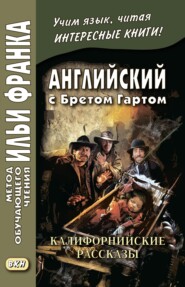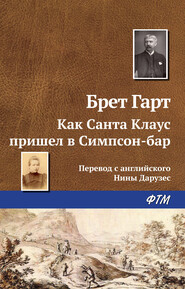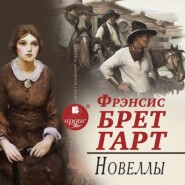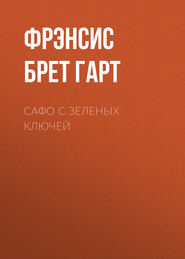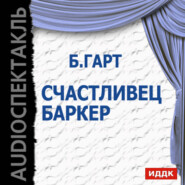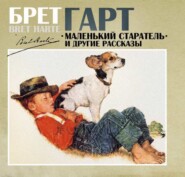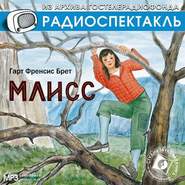По всем вопросам обращайтесь на: info@litportal.ru
(©) 2003-2024.
✖
Gabriel Conroy
Автор
Год написания книги
2017
Настройки чтения
Размер шрифта
Высота строк
Поля
Angry with himself for his embarrassment, and for the rising colour on his cheek, Arthur would have explained himself, but the lady, with feminine tact, did not permit him.
"To proceed: Partly because I did not participate in the prejudices with which the old families here regarded her race and colour, partly, perhaps, because we were both strangers here, we became friends. At first she resisted all my advances – indeed, I think she was more shy of me than the others, but I triumphed in time, and we became good friends. Friends, you understand, Mr. Poinsett, not confidants. You men, I know, deem this impossible, but Donna Dolores is a singular girl, and I have never, except upon the most general topics, won her from her habitual reserve. And I possess perhaps her only friendship."
"Except Father Felipe, her confessor?"
Mrs. Sepulvida shrugged her shoulders, and then borrowed the habitual sceptical formula of San Antonio.
"Quien sabe? But I am rambling again. Now for the case."
She rose, and taking from the drawer of the secretary an envelope, drew out some papers it contained, and referred to them as she went on.
"It appears that a grant of Micheltorena to Salvatierra was discovered recently at Monterey, a grant of which there was no record among Salvatierra's papers. The explanation given is that it was placed some five years ago in trust with a Don Pedro Ruiz, of San Francisco as security for a lease now expired. The grant is apparently regular, properly witnessed, and attested. Don Pedro has written that some of the witnesses are still alive, and remember it."
"Then why not make the proper application for a patent?"
"True, but if that were all, Don Arturo would not have been summoned from San Francisco for consultation. There is something else. Don Pedro writes that another grant for the same land has been discovered recorded to another party."
"That is, I am sorry to say, not a singular experience in our profession," said Arthur, with a smile. "But Salvatierra's known reputation and probity would probably be sufficient to outweigh equal documentary evidence on the other side. It's unfortunate he's dead, and the grant was discovered after his death."
"But the holder of the other grant is dead too!" said the widow.
"That makes it about equal again. But who is he?"
Mrs. Sepulvida referred to her papers, and then said —
"Dr. Devarges."
"Who?"
"Devarges," said Mrs. Sepulvida, referring to her notes. "A singular name – a foreigner, I suppose. No, really Mr. Poinsett, you shall not look at the paper until I have copied it – it's written horribly – you can't understand it! I'm really ashamed of my writing, but I was in such a hurry, expecting you every moment! Why, la! Mr. Poinsett, how cold your hands are!"
Arthur Poinsett had risen hurriedly, and reached out almost brusquely for the paper that she held. But the widow had coquettishly resisted him with a mischievous show of force, and had caught and – dropped his hand!
"And you are pale, too. Dear me! I'm afraid you took cold that morning," said Mrs. Sepulvida. "I should never forgive myself if you did. I should cry my eyes out!" and Donna Maria cast a dangerous look from under her slightly swollen lids that looked as if they might threaten a deluge.
"Nothing, nothing, I have ridden far this morning, and rose early," said Arthur, chafing his hands with a slightly embarrassed smile. "But I interrupted you. Pray go on. Has Dr. Devarges any heirs to contest the grant?"
But the widow did not seem inclined to go on. She was positive that Arthur wanted some wine. Would he not let her order some slight repast before they proceeded further in this horrid business? She was tired. She was quite sure that Arthur must be so too.
"It is my business," said Arthur, a little stiffly, but, recovering himself again in a sudden and new alarm of the widow, he smiled and suggested the sooner the business was over, the sooner he would be able to partake of her hospitality.
The widow beamed prospectively.
"There are no heirs that we can find. But there is a – what do you call it? – a something or other – in possession!"
"A squatter?" said Poinsett, shortly.
"Yes," continued the widow, with a light laugh; "a 'squatter,' by the name of – of – my writing is so horrid – let me see, oh, yes! 'Gabriel Conroy.'"
Arthur made an involuntary gesture toward the paper with his hand, but the widow mischievously skipped toward the window, and, luckily for the spectacle of his bloodless face, held the paper before her dimpled face and laughing eyes, as she did so.
"Gabriel Conroy," repeated Mrs. Sepulvida, "and – and – and – his" —
"His sister?" said Arthur, with an effort.
"No, sir!" responded Mrs. Sepulvida, with a slight pout, "his wife! Sister indeed! As if we married women are always to be ignored by you legal gentlemen!"
Arthur remained silent, with his face turned toward the sea. When he did speak his voice was quite natural.
"Might I change my mind regarding your offer of a moment ago, and take a glass of wine and a biscuit now?"
Mrs. Sepulvida ran to the door.
"Let me look over your notes while you are gone," said Arthur.
"You won't laugh at my writing?"
"No!"
Donna Maria tossed him the envelope gaily and flew out of the room. Arthur hurried to the window with the coveted memoranda. There were the names she had given him – but nothing more! At least this was some slight relief.
The suddenness of the shock, rather than any moral sentiment or fear, had upset him. Like most imaginative men, he was a trifle superstitious, and with the first mention of Devarges's name came a swift recollection of Padre Felipe's analysis of his own character, his sad, ominous reverie in the chapel, the trifling circumstance that brought him instead of his partner to San Antonio, and the remoter chance that had discovered the forgotten grant and selected him to prosecute its recovery. This conviction entertained and forgotten, all the resources of his combative nature returned. Of course he could not prosecute this claim; of course he ought to prevent others from doing it. There was every probability that the grant of Devarges was a true one – and Gabriel was in possession! Had he really become Devarges's heir, and if so, why had he not claimed the grant boldly? And where was Grace?
In this last question there was a slight tinge of sentimental recollection, but no remorse or shame. That he might in some way be of service to her, he fervently hoped. That, time having blotted out the romantic quality of their early acquaintance, there would really be something fine and loyal in so doing, he did not for a moment doubt. He would suggest a compromise to his fair client, himself seek out and confer with Grace and Gabriel, and all should be made right. His nervousness and his agitation was, he was satisfied, only the result of a conscientiousness and a delicately honourable nature, perhaps too fine and spiritual for the exigencies of his profession. Of one thing he was convinced: he really ought to carefully consider Father Felipe's advice; he ought to put himself beyond the reach of these romantic relapses.
In this self-sustained, self-satisfied mood, Mrs. Sepulvida found him on her return. Since she had been gone, he said, he had been able to see his way quite clearly into this case, and he had no doubt his perspicacity was greatly aided by the admirable manner in which she had indicated the various points on the paper she had given him. He was now ready to take up her own matters, only he begged as clear and concise a brief as she had already made for her friend. He was so cheerful and gallant that by the time luncheon was announced the widow found him quite charming, and was inclined to forgive him for the disappointment of the morning. And when, after luncheon, he challenged her to a sharp canter with him along the beach, by way, as he said, of keeping her memory from taking cold, and to satisfy herself that the Point of Pines could be doubled without going out to sea, I fear that, without a prudent consideration of the gossips of San Antonio before her eyes, she assented. There could be no harm in riding with her late husband's legal adviser, who had called, as everybody knew, on business, and whose time was so precious that he must return even before the business was concluded. And then "Pepe" could follow them, to return with her!
It did not, of course, occur to either Arthur or Donna Maria that they might outrun "Pepe," who was fat and indisposed to violent exertion; nor that they should find other things to talk about than the details of business; nor that the afternoon should be so marvellously beautiful as to cause them to frequently stop and admire the stretch of glittering sea beyond; nor that the roar of the waves was so deafening as to oblige them to keep so near each other for the purposes of conversation that the widow's soft breath was continually upon Arthur's cheek; nor that Donna Maria's saddle girth should become so loose that she was forced to dismount while Arthur tightened it, and that he should be obliged to lift her in his arms to restore her to her seat again. But finally, when the Point of Pines was safely rounded, and Arthur was delivering a few parting words of legal counsel, holding one of her hands in his, while with the other he was untwisting a long tress of her blown down hair, that, after buffeting his cheek into colour, had suddenly twined itself around his neck, an old-fashioned family carriage, drawn by four black mules with silver harness, passed them suddenly on the road.
Donna Maria drew her head and her hand away with a quick blush and laugh, and then gaily kissed her finger-tips to the retreating carriage. Arthur laughed also – but a little foolishly – and looked as if expecting some explanation.
"You should have your wits about you, sir. Did you know who that was?"
Arthur sincerely confessed ignorance. He had not noticed the carriage until it had passed.
"Think what you have lost! That was your fair young client."
"I did not even see her," laughed Arthur.
"But she saw you! She never took her eyes off you. Adios!"
CHAPTER VI.
THE LADY OF GRIEF
"You will not go to-day," said Father Felipe to Arthur, as he entered the Mission refectory early the next morning to breakfast.
"I shall be on the road in an hour, Father," replied Arthur, gaily.







